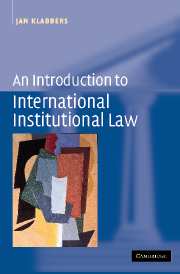Book contents
- Frontmatter
- Contents
- Preface
- Acknowledgements
- Table of cases
- A note on documentation
- List of abbreviations
- 1 Introduction
- 2 The rise of international organizations
- 3 The legal position of international organizations
- 4 The foundations of powers of organizations
- 5 International organizations and the law of treaties
- 6 Issues of membership
- 7 Financing
- 8 Privileges and immunities
- 9 Institutional structures
- 10 Legal instruments
- 11 Decision-making and judicial review
- 12 Dispute settlement
- 13 Treaty-making by international organizations
- 14 Issues of responsibility
- 15 Dissolution and succession
- 16 Concluding remarks: re-appraising international organizations
- Bibliography
- Index
16 - Concluding remarks: re-appraising international organizations
Published online by Cambridge University Press: 05 June 2012
- Frontmatter
- Contents
- Preface
- Acknowledgements
- Table of cases
- A note on documentation
- List of abbreviations
- 1 Introduction
- 2 The rise of international organizations
- 3 The legal position of international organizations
- 4 The foundations of powers of organizations
- 5 International organizations and the law of treaties
- 6 Issues of membership
- 7 Financing
- 8 Privileges and immunities
- 9 Institutional structures
- 10 Legal instruments
- 11 Decision-making and judicial review
- 12 Dispute settlement
- 13 Treaty-making by international organizations
- 14 Issues of responsibility
- 15 Dissolution and succession
- 16 Concluding remarks: re-appraising international organizations
- Bibliography
- Index
Summary
Introduction
It was stated in the beginning of this book that an important characteristic of the study of international organizations is the absence of a single perspective on them. Instead, as the previous chapters have sought to demonstrate, many of the ideas invoked in the law of international organizations can be traced back to different conceptions of what organizations are, and more specifically to different perspectives on the relationship between international organizations and their member-states.
What I hope to have indicated in the preceding chapters is that these contending perspectives are reflected in much of what we usually think of as the law of international organizations. In many respects, this branch of the law is ambiguous, and cannot make up its mind whether to err on the side of the member-states, or whether to err on the side of international organizations (although it often ends up doing the latter). Thus, we find implied powers alongside attributed powers; we find residual liability side by side with limited or no liability, while member-states and organs are both interested in admitting new members.
That is, we may presume, a structural situation, which finds its origin in the fundamental tension lying at the heart of international law generally, and arguably of all law: the idea that law, in the absence of some form of agreement as to how best to organize our lives, in the absence of some concord; on what constitutes the good life, has to cater to two fundamentally irreconcilable demands.
- Type
- Chapter
- Information
- An Introduction to International Institutional Law , pp. 334 - 344Publisher: Cambridge University PressPrint publication year: 2002



